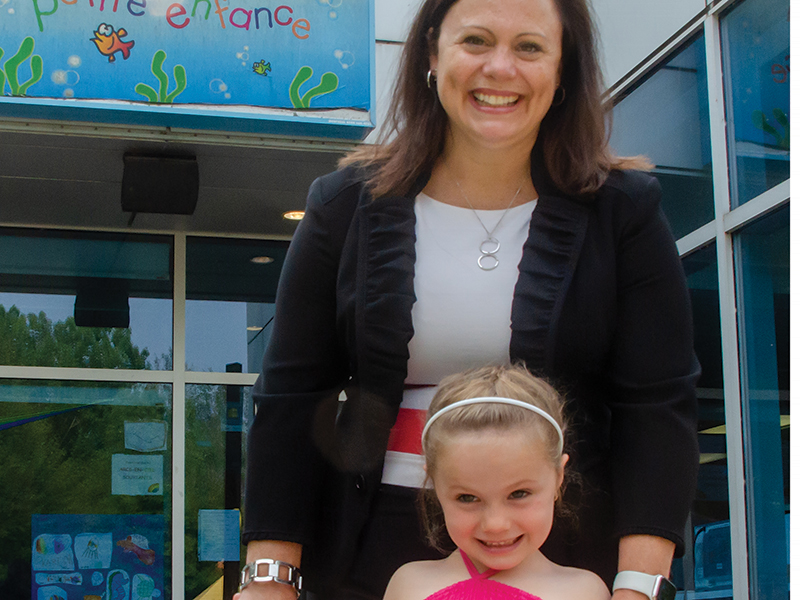

Mélanie Perreault knows firsthand how hard it can be for employees to juggle raising children while simultaneously building a career.
The onsite daycare at L’Oréal Canada’s distribution centre in Saint-Laurent, Que. has been key to balancing these priorities for the beauty company’s director of management and development of human resources, operations, information technology, sourcing and quality assurance in Canada, along with many other employees.
Read: Twitter supporting working parents via virtual camp, learning offerings this summer
“With three kids who went to the daycare, [I can say] this daycare is quite fabulous,” she says. “It really gives the message to the community, to your employees, to anyone who’d be interested in joining L’Oréal that you have a daycare onsite because family and work-life balance is important for this organization. So definitely, it’s part of our core values. . . . If you take care of your employees and their family, this is what makes a company great and it’s really key to sustainable growth of your organization.”
Nurturing growth
The daycare, which opened in 2002, originally accommodated 37 children and has now expanded to serve 67. All are mainly offspring of staff from L’Oréal’s distribution centre and nearby plant and head office, as well as some local kids. Since the onset of the coronavirus pandemic, the daycare has served frontline, essential employees in the community who couldn’t work from home and needed daycare, including distribution and plant staff.
The daycare never closed full time and welcomed kids with special needs from other daycares that had to shutter amid the coronavirus crisis, says Perreault. L’Oréal Canada received an honourary medal from the Quebec national assembly last fall for its commitment to the community, which is about 20 kilometres west of Montreal.
Read: How Accenture is supporting working parents amid the coronavirus crisis
In normal times, the daycare goes beyond simply providing working parents with somewhere to put their children during the workday. The facility routinely has doctors, specialists, paediatric psychologists and speech therapists on hand to help kids prosper. And it even has a beehive and urban vegetable garden that Perreault’s children helped inaugurate in 2018. The daycare is focused on supporting the “safety, security and well-being of kids” so employees can focus on their jobs feeling reassured their children are in good hands, she says.
The award-winning daycare is possible via a mix of company, provincial and local funding. While Quebec has long had a subsidized provincial daycare program, employers and employees in other Canadian provinces and territories haven’t been as fortunate.
By the numbers
• Provincially subsidized daycare in Quebec, including L’Oréal’s daycare, currently costs $8.50 per day per child or about $187 per month.
• Meanwhile, parents in Canada’s largest city, Toronto, shelled out a median of $1,774 monthly for infant childcare in 2019, according to a study by the Canadian Centre for Policy Alternatives.
• And, while the current federal government has promised $10 per day childcare, a likely election this fall [ed note: an election is now set for Sept. 20] means when, or if, that will happen remains to be seen.
But that could change, as Prime Minister Justin Trudeau’s government promised in the spring budget to build a Canada-wide, community-based national childcare system and committed to working with provincial, territorial and Indigenous partners.
Read: National childcare program ‘first step’ in getting women back to work: expert
In early July, the federal government reached an agreement with British Columbia, saying it will invest $3.2 billion over the next five years to help improve regulated early learning and childcare for kids under the age of six in the province. The agreement includes the goal of $10 per day childcare and noted that, by the end of 2022, B.C. residents will see a 50 per cent reduction in average fees for children under the age of six in regulated childcare. The government has reached a similar agreement with Manitoba and Nova Scotia.
Embracing flexibility
Paula Allen, global leader and senior vice-president of research and total well-being at LifeWorks Inc., believes now is the time for a national childcare program to actually come to fruition. “Eventually it will happen. . . . There’s been so many women who’ve left the workforce just over the last little while because of challenges with respect to daycare and, really, our economies can’t sustain that.”
For now, not many Canadian employers outside of Quebec offer onsite daycare, but Allen says there’s a range of ways to support employees with children. “I think the daycare situation is interesting across the board. Onsite is helpful for some, [but] some prefer to make sure they’re close to the school they need to be going to. It’s not a major perk for everyone; some would prefer to have childcare subsidies so they can choose the daycare and choose their daycare provider.”
Read: How employers can support working mothers during the ongoing pandemic
One of the many lessons the pandemic has taught employers is that offering flexibility — through childcare perks and benefits packages, as well as when and where work is done — can be a simple and cost-effective way to support staff, says Allen.
Perreault agrees, noting she expects flexibility for L’Oréal staff, including working parents, to continue long after the pandemic recedes. “How we take care of our employees is what makes the company great. We think that the best way . . . for talent, to hopefully develop their potential is to make sure they have a happy, balanced professional life and they have a happy, full personal life.”
Melissa Dunne is the managing editor of Benefits Canada.
